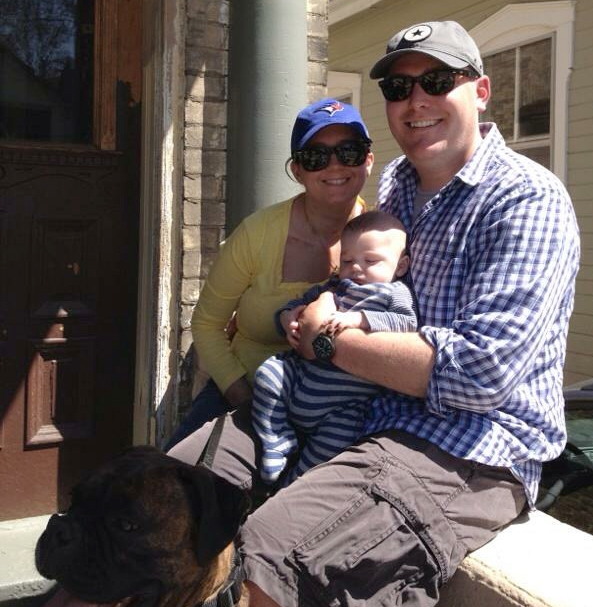
Can you imagine if your heart stopped for 87 minutes? This was the reality for Martha McDougall of London, who survived this incredible ordeal at 30 years old with the help of London Health Sciences Centre (LHSC).
In late January 2013, Martha – a first-time mother who was 37 weeks pregnant – started experiencing flu-like symptoms and dizzy spells. One night while walking into her kitchen, she blacked out. Her husband Marc immediately called 911 and Martha was rushed to LHSC.
At LHSC’s Victoria Hospital, doctors discovered that Martha had a blood clot in her groin. With Martha in her current state, doctors had to act fast in order to save her baby, who was starting to show signs of distress. Martha was put into an induced coma and an emergency c-section was performed right away.
“Before I passed out, I remember begging them to not let me die and to not let anything happen to my baby,” says Martha.
The emergency c-section was a success and her son Abel was welcomed into the world. However, as they were closing the incision, an anesthesiologist detected Martha’s heart was no longer beating. Martha was experiencing a massive pulmonary embolism which was blocking an artery in her lungs and affecting her breathing and blood flow.
A team of doctors, nurses and interns sprang into action and started performing CPR yet after 30 minutes, there were still no vital signs. Dr. Farouq Manji, an emergency resident, made the call to continue CPR for a total of 87 minutes, the exact amount of time Martha’s heart needed in order to start beating again.
“They think they were making the clot ‘jump’ enough and fresh blood was coming to my brain and my heart. They were doing very intense, but very effective, CPR, which ended up leading to a ruptured spleen and a few broken ribs. I didn’t care about that though because they had just saved my life,” says Martha.
Dr. Linrui Guo, a cardiac surgeon from LHSC’s University Hospital, was called in and connected Martha to a bypass machine, which began to pump more blood into her veins. Martha had sustained some internal bleeding, due to her ruptured spleen, and she was in need of more blood to keep her heart beating.
“There ended up being too much blood in my arm, so I got compartment syndrome. They had to do a fasciotomy, a surgical procedure where they opened up every compartment of my arm. It actually was what saved my arm,” says Martha.
Within just a few days of her hospital stay, Martha had undergone a total of 14 surgeries. Doctors believed that she was going to live, but were unsure about the quality of life she would have.
“When I was still under for the first couple of days, they told my mom and Marc that there’s no way that she’ll come out of this with no brain damage,” says Martha.
Eventually, Martha’s health improved and she responded well to her neurologist’s tests, which indicated no brain damage.
“Lots of people in the hospital were amazed at my story and would come from different areas or departments to visit with me and tell me such positive things. Dr. George Rice, a family friend, came to visit and reassured my mother that everything was going to be ok and I was considered to be a miracle,” says Martha.
Martha’s stay at LHSC lasted a total of 47 days. For the first month of his life, Marc took care of Abel with the help of his mother, until Martha was finally able to meet her baby boy.
“The nurses were my heroes. They helped make my care better by putting together photos of Abel and our family on a Bristol board and put decorations on the windows, so I would know what was happening. I actually got to meet Abel on Family Day, so now we have a little celebration on that day every year now,” says Martha.
Today, Abel is four years old and Martha couldn’t ask for a more perfect child. Martha is thankful to all the staff at LHSC for the hard work they put in every day to save patient lives, including her own.
“You learn a lot about how resilient you are. So if somebody can read my story with a happy ending and realize there are happy endings, maybe that’s enough to make people want to give and support the hospital,” says Martha.
